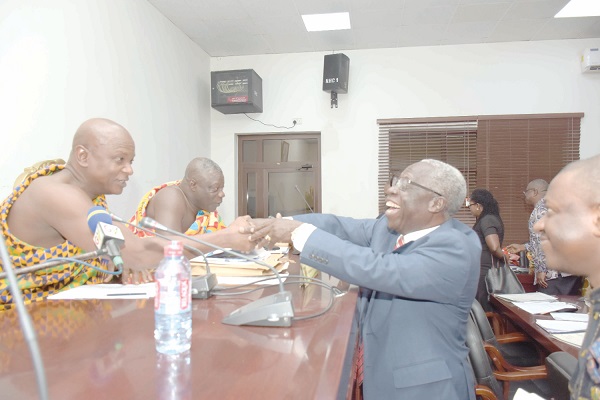
House of Chiefs urges govt to enhance corruption fight
The President of the National House of Chiefs and the Agbogbomefia of the Asogli State, Togbe Afede XIV, has urged the government to double its efforts in the fight against corruption.
He said at the moment there were some question marks in the government’s commitment to fight the canker because some of the measures taken so far were rather making it difficult to achieve the desired objectives.
Addressing a consultative meeting of the National House of Chiefs in Kumasi yesterday, Togbui Afede asserted that to ask people who made corruption allegations to provide evidence was to say the government was not concerned.
Rather, he said, the government should be able to secure warrants to go into the accounts of persons against whom corruption allegations had been made and question them on their sources of wealth, vis-a-vis their incomes or take-home pay.
"We must go beyond just talks and take action. Corruption is one main stumbling block to our development and it has to be stopped,” Togbe Afede said, and asked the government to demonstrate a commitment towards its fight.
The meeting, the third by the house this year, received presentations from the Ghana Beyond Aid Committee, as well as the Commission on Human Rights and Administrative Justice (CHRAJ).
Ghana Beyond Aid agenda
The Ghana Beyond Aid Committee was before the House of Chiefs to seek its input to firm up a draft document to shape the new vision to build national concensus on the development agenda of Ghana.
The document is currently being fine-tuned through broad-based consultations.
The final document is expected to be presented to Parliament for review and eventual passage into law.
The committee, which is chaired by the Senior Minister, Mr Yaw Osafo-Maafo, is made up of a cross-section of institutions and individuals, civil society groups, academia and representatives of workers’ groups.
Already, views have been sought from a number of stakeholders, including the University of Ghana, Legon, and the Kwame Nkrumah University of Science and Technology (KNUST).
Attitudinal change
Mr Osafo-Maafo, who addressed the chiefs, said the new vision would hinge on attitudinal change.
He said the document was being shaped around 10 thematic areas, including microeconomic stability, a robust financial sector and anti-corruption.
The common thread of the document was how to harness Ghana's resources and deploy them efficiently and creatively to enable the country to break away from the mentality of dependency and take on a can-do spirit, the minister explained.
He said between 2010 and 2017, aid and grants to the country dropped from 5.6 per cent to 3.7 per cent of Gross Domestic Product (GDP), respectively 2.3 per cent each, an indication that Ghana could not rely on aid.
"Looking at our resources, we can do things differently to develop,” Mr Osafo-Maafo said, and called for collective action to make the dream a reality.
Accountability models
For its part, CHRAJ presented details of its advocacy for a national cultural review built on integrity and honesty to help stamp out corruption.
A Deputy Commissioner of CHRAJ, Mr Richard Quayson, who made the presentation, entreated chiefs to create ethical environments and codes of conduct towards a new culture built on integrity and honesty to help stamp out corruption in society.
He also urged them to be role models of integrity and accountability in their respective communities, saying it was because cultural values had eroded that corruption had become acceptable in the Ghanaian society.
Mr Quayson said 20 per cent of Ghana's annual budget was lost to corruption, a situation which, if not tackled, could drain its coffers.
He said it was in that regard that CHRAJ set up a National Corruption Action Plan (NACAP) to tackle the menace through a multi-stakeholder approach.
The NACAP, he said, was a 10-year plan to contextualise and mobilise efforts and resources of stakeholders, including the government and civil society groups, to deal with corruption in the country.
The plan involves focusing on developing people’s capacities to condemn corrupt acts and make corruption a high-risk and low-gain venture.
